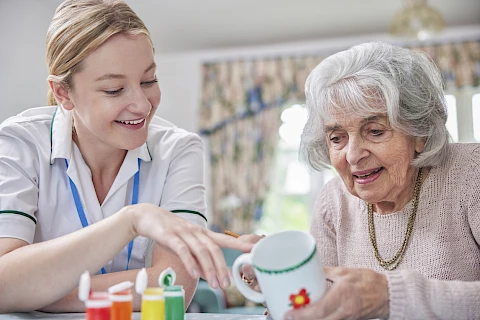
As we grow older, our vision often declines. Many seniors face vision impairments like macular degeneration, glaucoma, and cataracts. Vision loss can drastically affect daily living, making simple tasks challenging and reducing quality of life. Fortunately, occupational therapy can help seniors adapt to vision loss. This therapy teaches new skills, recommends assistive devices, and makes home modifications to improve safety and independence.
Vision Impairments in Seniors
Seniors commonly experience various types of vision impairments. Conditions like macular degeneration can blur central vision, while glaucoma can create blind spots. Cataracts, on the other hand, cloud vision. These issues impact daily activities. Reading, cooking, or even navigating the home can become daunting tasks. Vision loss can also lead to social isolation and depression. Addressing these problems is vital for maintaining a good quality of life.
How Occupational Therapy Helps
Occupational therapy focuses on helping people do what they want and need to do through therapeutic methods. For seniors facing vision impairments, occupational therapists offer specialized support. They teach new skills, suggest assistive devices, and modify homes to create safer, more accessible environments.
Teaching New Skills
Adapting to vision loss often means learning new ways to perform everyday tasks. Occupational therapists teach seniors techniques to enhance their abilities. These might include:
- Using tactile markers: These help identify items like buttons on a microwave.
- Enhancing contrast: Using high-contrast colors can make distinguishing objects easier.
- Developing better lighting habits: Proper lighting can reduce glare and shadows.
Working with an occupational therapist can make those tasks much easier than when seniors try to handle them.
Recommending Assistive Devices
Several assistive devices can aid those with vision impairments. Occupational therapists recommend devices best suited for individual needs. These might include:
- Magnifying glasses: Useful for reading small print.
- Talking clocks and timers: Help maintain independence with auditory cues.
- Screen readers: Convert text on screens to speech for better access to information.
Occupational therapists evaluate each person to find the most effective devices, considering the specific type and extent of vision loss.
Modifying Living Spaces
A safe and accessible living environment is crucial for seniors with vision impairments. Occupational therapists assess homes and suggest practical modifications, such as:
- Better lighting: Adding brighter lights in key areas reduces fall risks.
- Removing hazards: Eliminating loose rugs and clutter helps prevent accidents.
- Marking edges of stairs: Using contrasting colors on stair edges enhances visibility.
These modifications help create a safer home, reducing the risk of falls and promoting independence.
The Benefits of Occupational Therapy for Seniors
Occupational therapy offers numerous benefits for seniors with vision impairments. Some key advantages include:
- Enhanced safety and reduced risk of falls
- Improved independence in daily activities
- Emotional and psychological support leads to a better quality of life
Occupational therapists provide personalized strategies and tools, enabling seniors to live more securely and independently.
Finding and Accessing Occupational Therapy Services
Finding the right occupational therapy services is essential. Local senior centers, healthcare providers, and community organizations often have information on occupational therapists. When choosing a therapist, consider their experience with vision impairments, approach to therapy, and ability to tailor solutions to individual needs.
Provide More Assistance for Seniors With Declining Vision
Occupational therapy offers significant benefits for those facing vision impairments. From teaching new skills and recommending assistive devices to modifying living spaces, occupational therapists help enhance safety and independence, improving the overall quality of life. If you or a loved one needs assistance, don't hesitate to seek these valuable services. Contact Senior Helpers Greater Cincinnati to improve the quality of life for seniors in Hamilton, Fairfield, Middletown, Cincinnati, and Milford.